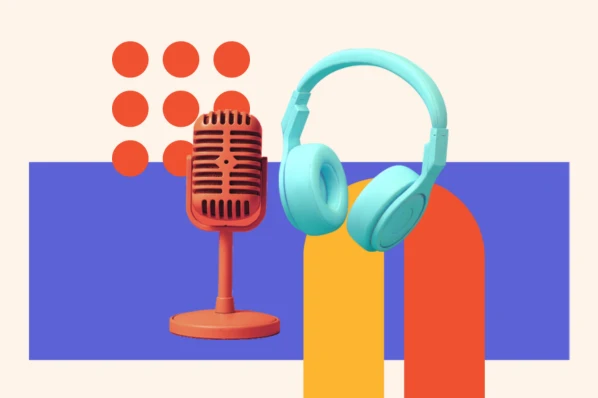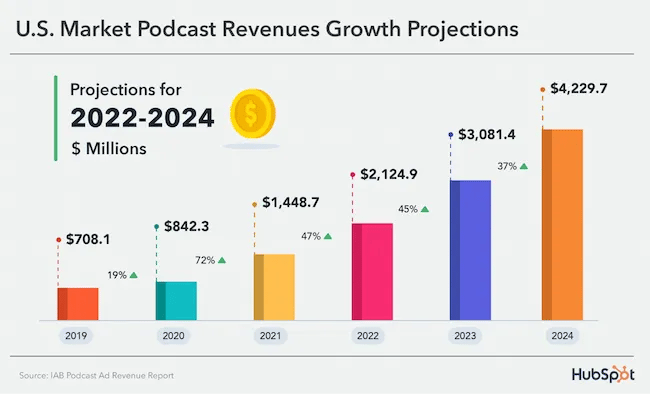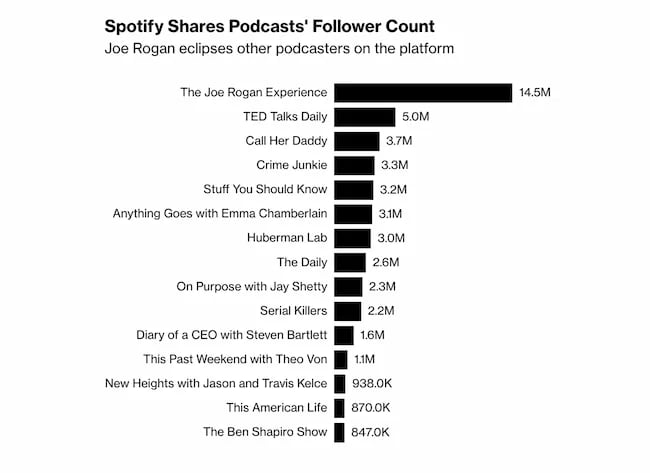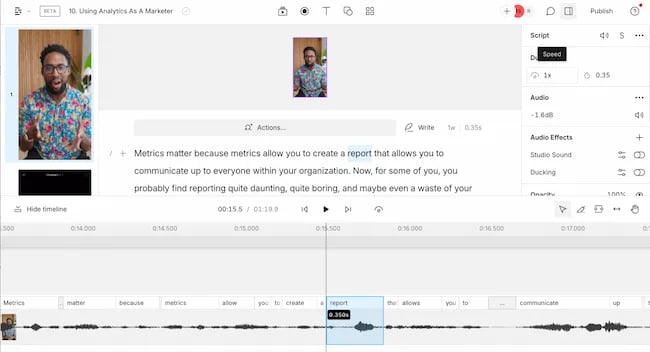How AI Is Changing Podcasts, Audiobooks & More
- May 3, 2024
- Knowledge Base
- 0 Comments

Welcome to Creator Columns, where we bring expert HubSpot Creator voices to the Blogs that inspire and help you grow better.
We are undeniably in the golden age of audio content.
But what’s even more interesting is that we’re also in the early days of AI-generated audio content.
AI-generated podcasts, AI-transcribed audiobooks, and AI-generated music are now more accessible than ever before. It’s easier than ever to stumble upon AI-generated audio content (maybe without realizing it), and it’s easier than ever to create AI-generated content.
But what does AI-created audio mean for the future of audio content? How will AI continue to change the landscape of podcasts, audiobooks, and other audio content?
I talked about that in my podcast and will be talking about it again in this piece:
There’s no denying that AI has already had an impact on the world. With voice assistants like Siri and Alexa, we’ve become accustomed to interacting with AI through speech without really thinking about it. But as of late, the rise of AI-related audio has taken new heights.
New heights that are influencing the way marketers do their jobs, salespeople execute their efforts, and leaders show up on a day-to-day basis.
In this article, we’re going to be diving into the current best practices of audio AI, what it is, how it’s changing business, and what the future will hold.
Let’s get into it.
What is audio AI?
Audio AI is the use of artificial intelligence algorithms to generate, alter, or enhance audio experiences in ways that sound natural.
From synthesizing human-like voices for podcasts and audiobooks to composing original music pieces without the need for human intervention, audio AI is breaking new ground.
The technology behind audio AI has the capability to understand, process, and respond to natural language inputs, allowing for interactive experiences and transforming passive listening into an engaging dialogue between the user and the technology.
Here’s an example of an audio-based YouTube video that I created with AI audio:
It might not pick up on my Canadian “Abouts,” but it’s pretty close …
I created the audio using ElevenLabs and then let my video team do the rest.
The Power Of Audio Content
Audio content, such as podcasts, has become an invaluable asset for marketers and brands alike.
According to podcast data from IAB, the market for podcast-related revenue in 2024 is expected to surpass more than $4.2 billion:

The podcast market is huge.
Brands are realizing that podcasts as an audio platform allow for a level of intimacy and engagement that is unparalleled, creating a direct line to the listener’s ear and, most crucially, their mind. This direct access grants marketers the power to craft narratives, convey messages, and build brand loyalty in a way that feels personal and genuine.
Podcasts like My First Million, Marketing Against The Grain, Another Bite, and Create Like The Greats are all examples of shows that create value for audiences while providing value to brands.
When Spotify recently published the follower count of some of their top podcasts, the Internet exploded in surprise at the amount of reach that these podcasters have:

Millions of followers.
Millions of listeners.
Millions in revenue.
The power of podcasting and audio cannot continue to be discounted as a fringe marketing opportunity. The opportunity for brands to capitalize on audio-driven marketing is real.
But AI is making things a whole lot more interesting …
The Impact of AI on Audio Content Creation
AI’s role in the creation of scripts and content for podcasts and audiobooks represents nothing short of a revolution in the production of audio content.
Leveraging sophisticated algorithms, artificial intelligence is now capable of analyzing vast databases of language and story structures to generate coherent, engaging narratives that captivate listeners and become podcasts for people to consume.
Technologies like ElevenLabs allow brands to configure the perfect computer-generated voice and even translate those voices into different languages. The impact that this type of technology can have on podcast creators is multifaceted.
Here are five major ways audio AI is influencing and impacting the world:
1. Increased Productivity
AI-driven audio tools can streamline the process for so many things.
It can elevate the podcast creation process by significantly reducing the amount of work needed during the post-production stage. It can replace the entire recording process for an audiobook. And it can fix anything said incorrectly during a podcast in a matter of a few clicks.
Common use cases for AI in audio content include fixing volume and tone and removing unnecessary background noise. You can isolate a voice from background music using AI and you can remove barking dogs from an audio clip that you didn’t want to make an appearance.
AI-based voice synthesis also expedites the production of audio content by eliminating the need for extensive recording sessions.
2. Internationalization Of Content
AI is dramatically transforming the landscape of audio content by breaking down the barriers of language and making content universally accessible. With advanced language translation technologies, AI can instantly translate spoken content into multiple languages, enabling podcasts, audiobooks, and other forms of audio media to reach a global audience.
This capability not only enhances the listener’s experience by providing content in their native language but also opens new markets for content creators. By leveraging AI for translation, creators can now produce a single piece of content and distribute it worldwide, significantly increasing their reach and impact. This development in AI technology is pivotal for fostering global connections and understanding through the power of audio content.
In 2023, Spotify introduced their first experiment with AI Translation and the translation hub:
It’s only a matter of time before any podcast in the world can be heard in your own native tongue.
3. Increased Content Velocity
There’s no question that AI offers podcasters the chance to improve the velocity with which they create content. It’s risky because listeners might hate it, but thanks to audio AI, you can upload a podcast script and have the script read in your voice in a matter of seconds.
Sore throat? You can still record.
Feeling under the weather? You can still record.
Forgot your audio equipment at home? You can still record.
The power of AI audio is in the fact that you can create podcast content no matter where you are.
4. Improved Editing Efficiencies
This technology enables the production of a high volume of episodes rapidly, catering to the insatiable demand for fresh content. Furthermore, AI’s ability to analyze listener preferences and trends in real time allows for the creation of highly targeted and relevant content, enhancing listener engagement, and brand loyalty.
In Descript, you have the ability to change actual words within a video using AI.
For example, in the sample below, I say, “Create a report.” But if I intended to say “create a document,” I could edit the text directly in Descript, and their AI engine would change my voice to say “document.”

Seems like magic, right?
I’ve used this technology to edit videos after I stumble over words and remove “umms” from videos where they don’t fit into the flow of the story.
AI-driven audio content creation is not just about doing more with less; it’s about opening new doors for brands to connect with their audience in more meaningful, personalized ways, thus driving their message home more effectively than ever before.
5. Reduced Authenticity For Listeners
Advancements in AI-driven audio content creation introduce a plethora of opportunities for efficiency and scale. But there’s an undeniable trade-off in authenticity for listeners.
Authenticity is the backbone of podcasting and most audio content success, with audiences gravitating toward content that feels genuine, raw, and human. The shift toward AI-generated podcasts raises questions about the future of this deeply human connection.
Listeners develop strong relationships with podcast hosts, often viewing them as trusted friends, peers or advisors. This bond is forged through the subtle nuances of human communication — tone, emotion, hesitation, and laughter — that AI has yet to replicate perfectly.
When content lacks these human elements, there’s a risk that listeners may feel disconnected or less engaged, potentially eroding the trust and loyalty podcasts have traditionally built.
In a world where authenticity is increasingly valued, the challenge for AI in audio content is clear: how to harness the efficiency and scalability of AI without sacrificing the genuine human touch that makes podcasts so compelling. This balance is the new frontier in audio content, requiring a careful blend of technology and humanity.
How AI Is Influencing Your Audio Content
Most people don’t realize that AI has been powering a lot of our lives without us knowing it.
That podcast you happened to stumble upon? AI helped.
That amazing YouTube channel you found? AI helped.
That cool sweater you just bought? AI helped.
That person you’re dating? Yeah. AI helped.
AI is all around us, and we often don’t even realize it. AI powers content recommendations on social media channels daily. AI powers music recommendations and even dating recommendations. For marketers, AI presents an opportunity to improve the ways in which your content is distributed.
Personalized Recommendations
AI algorithms have transformed content recommendations and distribution with increased personalization. Algorithms consider listeners’ previous interactions, preferences, and even time spent on specific types of content. This means they can predict what listeners might enjoy next with astonishing accuracy.
This enhances the user experience by serving more personal content and increases engagement and retention rates. It also opens up new opportunities for listeners to find new voices and stories.
Targeted Advertising
AI’s role in targeted audio advertising marks a significant shift in how brands connect with their intended audiences. It uses advanced algorithms to analyze data and find patterns in listener preferences that human analysis can’t detect.
These insights help advertisers to deliver hyper-targeted personal ads, which amplifies the impact of their ads. AI also improves ad placement in audio content (like podcasts.) It does this by placing ads in the best spots during audio content to keep listeners engaged and help them remember the message.
Analytics and Insights
In this era where content is king, AI’s is distilling vast amounts of listener data into coherent, actionable insights. This is revolutionizing the way we create, distribute, and market audio content.
It’s not just about understanding what listeners want today but predicting what they will crave tomorrow. AI is setting the stage for audio content’s future to be as dynamic and responsive as the technology that shapes it.
AI’s Role in Improving Accessibility
AI is improving accessibility in audio content by providing voices for those who can’t speak. It can also convert written materials into audio for those with visual or reading challenges. This technology is breaking down barriers to communication.
It’s a potent force for inclusivity, demolishing barriers to accessibility that have long marginalized certain listener groups. AI also offers real-time transcription and closed captioning. This makes podcasts accessible to the deaf and hard-of-hearing community, allowing for a broader audience to enjoy audio content.
Ethical Considerations and Challenges
Like any technology, AI in audio content raises ethical concerns about its potential for misuse. Its ability to synthesize hyper-realistic voices creates a risk that people could use it to deceive listeners.
The emergence of deepfake videos and AI scam calls show that this is a challenge that audio content creators and platforms must navigate. Transparency, verification processes, and responsible usage policies are essential in mitigating this risk.
In Tennessee, USA, they passed the Ensuring Likeness Voice and Image Security (ELVIS) Act. This is a first-of-its-kind legislation providing protections to songwriters, performers, and music industry professionals from the misuse of artificial intelligence to recreate their voice without permission.
The potential for misuse of AI in the creation of misleading or fake audio content cannot be ignored. This power to generate synthetic voices and manipulate speech poses significant risks. Imagine an environment flooded with audio clips that are indistinguishable from reality but are entirely fabricated. The implications for misinformation, identity theft, and defamation are profound.
Developing AI responsibly means ensuring that people use this technology to enrich society, not deceive it. This ethos must drive the future of audio AI technology, bridging the gap between innovation and ethical responsibility.
The Future of Audio AI
AI is continuously evolving, and with advancements in natural language processing, it’s only a matter of time before we see AI-generated audio content that is indistinguishable from human-created content.
One potential future for audio AI is the creation of entirely new forms of media, merging traditional storytelling with immersive and interactive experiences. This could open up new opportunities for brands to engage with audiences in unique ways.
Another exciting development is the use of AI to create a truly personal listening experience by automatically adjusting audio content based on the listener’s mood, location, and preferences. This could potentially lead to a more engaging and emotionally resonant experience for listeners.
Voice Synthesis and Modification: The Frontier of Customizable Audio
Voice synthesis and modification is not just advancing; it’s on the brink of revolutionizing how we perceive and interact with audio content.
With cutting-edge AI technologies, we’re witnessing the creation of hyper-realistic, AI-generated voices that are increasingly becoming indistinguishable from human ones. This leap forward is not merely about producing any voice but about customizing voices to suit specific needs and contexts, thereby making narration more accessible and customizable than ever before.
Companies like ElevenLabs, MurfAI and Voices are at the forefront, offering a suite of voice synthesis services that can mimic emotion, tone, and even specific accents. Descript, which uses AI-generated voice cloning to create natural-sounding voices from text, allowing for easier script writing and editing, is another audio AI tool worth watching.
The implications of this technology are vast and varied.
Voice cloning, for instance, allows voice actors and actresses to upload their voices to various audio AI marketplaces and be paid on a usage basis. This can be especially useful for ad creation, as it saves time and resources compared to a human having to go into the studio and actually record.
The rise of artificial intelligence in audio content is here.
AI-generated content and assisted content are providing improved efficiencies and inclusive listening experiences, as well as becoming a threat to the jobs of many. Audio AI presents marketers with a huge opportunity and brands with the ability to do things that were, at one point, nothing more than a dream.
Summed up:
It’s complicated.
On one end, I think it’s great that I can log into an audio AI tool and create an entire podcast episode for Create Like The Greats without saying an actual word. But on the other end … I know that with this type of technology comes the threat of bad actors and bad outcomes. My hope is that humanity will come through and that we’ll all be better off because of this technology.





